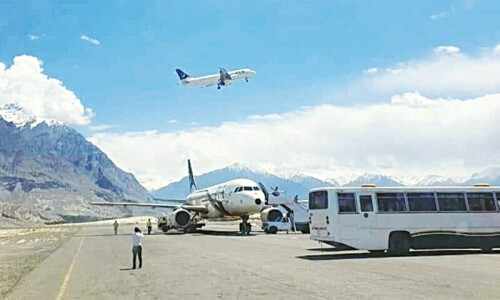ISLAMABAD, Sept 14: For the past two decades, privatisation has not resulted in development of the economy. Instead of privatising entire industries, the government should consider a public-private venture or privatise the management of public enterprises.
This was proposed by economist Dr Kaiser Bengali, former adviser to Sindh government, while addressing a public discussion titled “Agenda for Sustained Economic Revival” at a local hotel on Saturday. The talk was organised by the Social Policy and Development Centre (SPDC).
He said private companies acquired public entities for their land which could be used for commercial investments.
Furthermore, he said in the past, public organisations had been privatised and sold to foreign companies.
These companies initially brought foreign remittance but once they started making profits, the money flowed out of the country.
Therefore, Dr Kaiser proposed, the government should sell a portion of the enterprise to private companies. For example, he said the management of the Pakistan International Airlines (PIA) and the Pakistan Railways could be privatised so that the companies’ affairs were made more efficient and corruption free.
Similarly, he said land belonging to public enterprises should not be sold. Instead, companies should be given the land on lease.
In addition, he proposed that Pakistan Industrial Development Corporation (PIDC) should be revived so that the state developed an industry before selling it to private entities.
“However, since the government is currently not in a position to finance huge projects, a public-private venture should be used. Once the industry is set up and started running, it can be sold to the private sector,” he said.
Dr Kaiser also elaborated on the predicaments faced by the manufacturing industry.
He said subsequent governments had development expenditure which had drastically affected the industry. This had resulted in closing down of local industry.
In order to revive the manufacturing industry, he said the government should decrease GST (General Sales Tax) on goods from the current 17 per cent to 5 per cent. In contrast, GST on finance and telecom industry should be increased, he added.
Presenting statistics, he said the manufacturing industry bore almost 29 per cent of the total taxes collected by the government. Therefore, production cost increased and several industries were forced to close down.
“Industries are also shutting down so that their land can be used for private housing societies which provide more profit. For example, a cement factory in Karachi was closed so that a housing society could be developed in its stead, even though the industry was going in profit,” he said.
Dr Kaiser said the government also lost revenue when people quoted a lower price of imported products in official documents so that they had to pay less tax.
As a result, the local industry was unable to compete with the ‘cheaper’ imported products and was forced to close down.
Dr Kaiser also elaborated on the “dollar gap” i.e. excess of imports and how it affected the economy.
He said import of petroleum products made up almost 26 per cent of Pakistans total imports. This depleted the foreign exchange reserves.
“Most of these petroleum products are consumed by the transport and power industry, and diesel import (which accounts for 55 per cent of petroleum products imported) has increased to cater for the long-distance transport of goods by road,” he said.
In contrast, Dr Kaiser said if these goods were transported by cargo rails, the consumption of diesel could be reduced by one-third. This would reduce the need for import, and would help bridge the dollar gap.
Similarly, he said the power sector accounted for almost 46 per cent of oil consumption. Therefore, it was necessary to explore alternative sources of energy such as hydel power and coal.
He said coal could be used to produce 20,000 megawatts of electricity and coal driven thermal plants could be set up within five years.
However, Dr Kaiser said paperwork alone was of no use. In order to ensure these proposals were put into practice, it was necessary to increase public awareness.
“Similar to the charter of democracy, we need a ‘Charter of Economic Management’ in which politicians, bureaucrats, military personnel and all stakeholders agree on a certain economic framework,” he said.
















































Dear visitor, the comments section is undergoing an overhaul and will return soon.